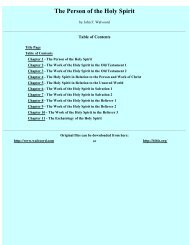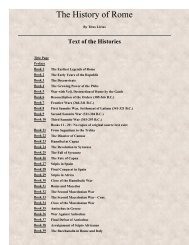Types in Hebrews - Table of Contents - Holy Pig Splash Page
Types in Hebrews - Table of Contents - Holy Pig Splash Page
Types in Hebrews - Table of Contents - Holy Pig Splash Page
Create successful ePaper yourself
Turn your PDF publications into a flip-book with our unique Google optimized e-Paper software.
<strong>Types</strong> <strong>in</strong> <strong>Hebrews</strong><br />
Sir Robert Anderson<br />
CHAPTER 3<br />
HEBREWS IN THE OLD TESTAMENT<br />
"GOD, hav<strong>in</strong>g <strong>of</strong> old time spoken unto the fathers <strong>in</strong> the prophets by diverse portions and <strong>in</strong> diverse<br />
manners, hath at the end <strong>of</strong> these days spoken unto us <strong>in</strong> His Son." 1<br />
Thus the Epistle to the <strong>Hebrews</strong> opens by declar<strong>in</strong>g the div<strong>in</strong>e authority <strong>of</strong> the Old Testament<br />
Scriptures. It is not merely that they were written by holy and gifted men, but that they are a div<strong>in</strong>e<br />
revelation. God spoke <strong>in</strong> the prophets. And the mention <strong>of</strong> "prophets" must not lead us to limit the<br />
reference to what we call "the prophetic Scriptures." Both <strong>in</strong> Hebrew and <strong>in</strong> Greek the term used is wide<br />
enough to <strong>in</strong>clude all the "diverse manners" <strong>in</strong> which God spoke to men - not only by prophecy (as the<br />
term is commonly understood), but by promise, law, exhortation, warn<strong>in</strong>g, type, parable, history. And<br />
always through <strong>in</strong>dividual men specially chosen and accredited. Through them it was that the revelation<br />
came. The highest privilege <strong>of</strong> "the Jewish Church" was its be<strong>in</strong>g entrusted with these "oracles <strong>of</strong> God";<br />
for not even <strong>in</strong> its darkest days did that church pretend to be itself the oracle. But the Christian apostasy<br />
is marked by a depth <strong>of</strong> bl<strong>in</strong>dness and pr<strong>of</strong>anity <strong>of</strong> which the Jew was <strong>in</strong>capable.<br />
To understand this Epistle we need to be familiar with the language <strong>in</strong> which it is written. And it is<br />
the language <strong>of</strong> that "div<strong>in</strong>e k<strong>in</strong>dergarten" - the typology <strong>of</strong> the Pentateuch. The precise po<strong>in</strong>t <strong>in</strong> Israel’s<br />
typical history at which the Epistle opens is the 24th chapter <strong>of</strong> Exodus; and this gives us the key to its<br />
scope and purpose. The Israelites were slaves <strong>in</strong> Egypt, but more than this, they had fallen under Egypt’s<br />
doom. For the death sentence was not upon the Egyptians only, but upon all the <strong>in</strong>habitants Of the land. 2<br />
But God not only provided a redemption, He also delivered His people from the House <strong>of</strong> Bondage.<br />
They were redeemed <strong>in</strong> Egypt by the blood <strong>of</strong> the Passover, and they were brought out <strong>of</strong> Egypt "with a<br />
mighty hand and with an outstretched arm." (Deuteronomy 26:8) And stand<strong>in</strong>g on the wilderness shore<br />
<strong>of</strong> the sea, they saw the waters clos<strong>in</strong>g over their enemies, and raised their triumph song to their Saviour<br />
God? (Exodus 15) But not even deliverance from both the guilt and the slavery <strong>of</strong> s<strong>in</strong> can give either title<br />
or fitness to draw near to a holy God. And at S<strong>in</strong>ai His care was lest the people, although thus redeemed,<br />
should approach the mounta<strong>in</strong> on which He was about to display His glory. (Exodus 19:21)<br />
The twenty-fourth chapter <strong>of</strong> Exodus emphasizes this still more strongly; for there we read that even<br />
Aaron and the elders were excluded. Moses alone might come near. And Moses’ right <strong>of</strong> access was due<br />
to his be<strong>in</strong>g a type <strong>of</strong> Christ, as mediator <strong>of</strong> the covenant. The record then recounts the dedication <strong>of</strong> the<br />
covenant. The blood <strong>of</strong> the covenant sacrifices was spr<strong>in</strong>kled, on the people - the elders presumably<br />
represent<strong>in</strong>g the whole congregation <strong>of</strong> Israel - and then we read, Aaron and the elders ascended the<br />
mounta<strong>in</strong> along with Moses. But yesterday it would have been death to them to "break through to gaze."








